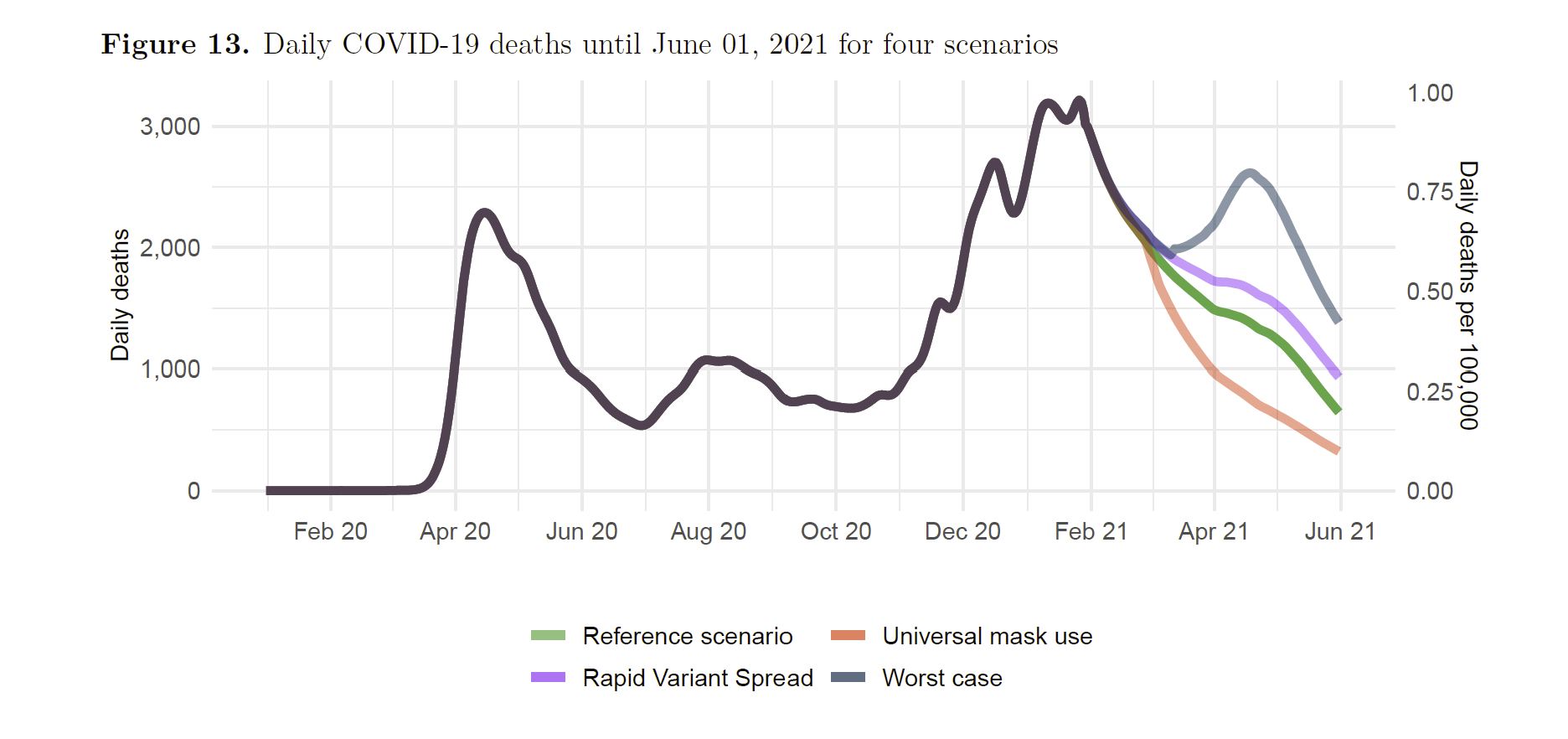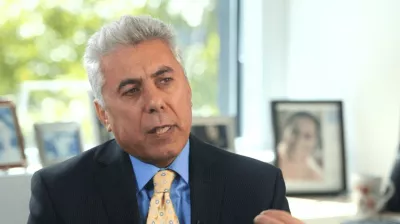Ensuring vaccine confidence
Published February 9, 2021
Dr. Ali Mokdad is Professor of Health Metrics Sciences at the University of Washington’s Institute for Health Metrics and Evaluation and Chief Strategy Officer for Population Health at the University of Washington. He recently published this commentary in EClinicalMedicine with renowned vaccine scientist Dr. Peter Hotez, and former director of the United States’ National Immunization Program Dr. Walter Orenstein, about the importance of improving vaccine confidence and effectively distributing vaccines quickly and equitably.
In another commentary published recently in EClinicalMedicine alongside Dr. Shadi Saleh and Dr. Hady Naal from the Global Health Institute at American University of Beirut, Dr. Mokdad stresses the equal right for refugees in Lebanon and all other Lebanese residents – not just citizens – to get the vaccines.
In this video, Dr. Mokdad discusses the importance of ensuring vaccine access to any individual irrespective of their citizenship status, creating a national vaccination plan that heavily involves participation at the local level, details on the COVID-19 virus mutations, and more.
(This video transcript has been lightly edited for clarity)
"It’s very important for every resident in a country to have access to the vaccine irrespective of their status…. Nobody should be left behind.”
As we roll out this vaccine, we need to make sure that everybody has access to it. It’s very important for every resident in a country to have access to the vaccine irrespective of their status. Right now, for example, Jordan is making it a priority to vaccinate Syrian refugees in Jordan and not only citizens. It’s vital for every country to reach out to the vulnerable populations in their community and ensure that they get a chance to get vaccinated. Otherwise, the virus will continue to circulate in our communities and may continue to mutate, and the vaccine that someone receives may not be effective against mutations.
For our own interests, and for everyone’s interests, everybody should get the vaccine irrespective of a person’s status. Nobody should be left behind.
Delays in vaccination have occurred in many countries, including the United States. We must understand where the problem is coming from.
Is it simply a problem of logistics? Are we not able to send the vaccines places? Do we not have enough people to vaccinate? Not enough vaccinators? Not enough places to deliver the vaccine? Is the public not willing to take the vaccine? Each one of these problems would require a different solution.
We need to keep in mind that every country needs a national plan to deliver the vaccine, but also that plan must take into account localities. Public health is local and vaccines will be given at the local level. We need to understand the capacity of the local level, the issues they face, and provide solutions for them. We need to work with them in order to ensure everybody has access to the vaccine – otherwise we will not reach herd immunity.
IHME’s COVID-19 projections show that a fast vaccine rollout has the potential to save many lives globally. A fast vaccine rollout will also help us to go back to normal lives much faster. To date, delays in vaccination have occurred in many countries, including the United States. Intensified efforts to ensure faster delivery are critical to slow the course of the pandemic in the coming months.
 Image Caption: The reference scenario is our forecast of what we think is most likely to happen. Vaccines are distributed at the expected pace. Governments adapt their response by re-imposing social distancing mandates for 6 weeks whenever daily deaths reach 8 per million, unless a location has already spent at least 7 of the last 14 days with daily deaths above this rate and not yet re-imposed social distancing mandates, in which case mandates are re-imposed when daily deaths reach 15 per million. Variant B.1.1.7 (first identified in the UK) continues to spread in locations where 100 or more isolates have been detected to date. This figure and caption are taken from our US COVID-19 Policy Briefing for February 3, 2021.
Image Caption: The reference scenario is our forecast of what we think is most likely to happen. Vaccines are distributed at the expected pace. Governments adapt their response by re-imposing social distancing mandates for 6 weeks whenever daily deaths reach 8 per million, unless a location has already spent at least 7 of the last 14 days with daily deaths above this rate and not yet re-imposed social distancing mandates, in which case mandates are re-imposed when daily deaths reach 15 per million. Variant B.1.1.7 (first identified in the UK) continues to spread in locations where 100 or more isolates have been detected to date. This figure and caption are taken from our US COVID-19 Policy Briefing for February 3, 2021.
As vaccine rollout gets underway and delivery issues are resolved, it’s very important to monitor attitudes toward the vaccine and address populations where vaccine hesitancy is high. For example, in the United States, 52% of Americans say they are willing to take the vaccine, while 24% say they are unsure [as of February 3, 63% of people say they are willing to take the vaccine and 19% say they are unsure]. It’s very important for all of us to have an education campaign targeted to a subgroup of the population who are currently not willing to accept the vaccine. This information needs to disseminate quickly so that by the time the vaccine is available, the vast majority of the population is willing to receive it.
As many countries are rolling out the vaccine right now, it’s very important to remember that many countries don't have the capacity to vaccinate their public or haven’t started their vaccination campaign. It’s very important for rich countries, after they vaccinate their public, to pay attention to poor countries and help them to make sure they vaccinate their public as well.
We have a new COVID-19 mutation in South Africa that’s concerning because the vaccines may not be as effective against the mutations that are circulating in the United States, England, or elsewhere. So rich countries must help other countries in order to get rid of this virus and reach a global herd immunity. If one country reaches herd immunity and its neighbor hasn’t, herd immunity will not last. People will likely move around and the virus will start circulating all over again – and worst case scenario, it could be a different version of the virus circulating. So we need to help each other. We’re all in it together, and it’s time to help each other in order to vaccinate the public and move forward.
What we know about viruses is that they do mutate, and they mutate a lot. So far we are aware of several mutations of COVID-19. Some of them are homegrown here in the United States and some of them happen elsewhere and they came here – the version B.1.1.7, first detected in the UK, for example. We’re also aware of version B.1.351, first detected in South Africa, that we are concerned about, where potentially the vaccine is not as effective against it like we’ve seen with other mutations of COVID-19.
It’s crucial for every country in the world to have a plan for genomic surveillance, to know what’s circulating at home and elsewhere. Once we reach herd immunity here in the United States and in many Western countries, it’s also important to do so in other countries because they have not reached herd immunity and the virus is still circulating in these countries. We need to know what type of virus is available or circulating before it comes to our countries.
“We cannot approach solving the COVID-19 pandemic from a single country approach or a single state approach. We need a universal plan in order to make sure nobody is left behind…”

Image Caption: Dr. Ali Mokdad is a professor of health metrics sciences at the University of Washington.
Again and again, it’s important for all of us to work together. Vaccinate everybody, every country in the world, and also at the same time perform genomic surveillance to make sure what kind and what type of mutations are happening elsewhere in order to be ready for it here at home and elsewhere.
We’re in it together, and working together is the most important thing. We cannot approach solving the COVID-19 pandemic from a single country approach or a single state approach. We need a universal plan in order to make sure nobody is left behind, everybody is vaccinated, and that we’re aware of what kind of mutations are occurring elsewhere in the world, otherwise we’re all at risk. Nobody will benefit unless all of us are benefitting.